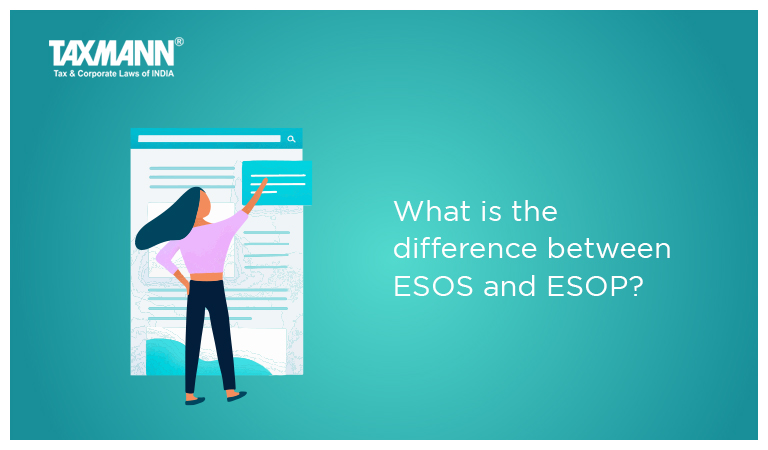What is the difference between ESOS and ESOP?
- Blog|Company Law|
- 3 Min Read
- By Taxmann
- |
- Last Updated on 30 August, 2022

Table of Content
- Eligibility of an employee to participate in Employee Stock Option Scheme (ESOS)
- What is the difference between ESOS vs ESOP?
Check out Taxmann's CRACKER for Company Law which covers all past exam questions & detailed (point-wise) answers for the CS-Executive exam by ICSI till June 2022. It covers the latest applicable provisions and amendments under the respective laws & amendment-based questions as well. CS-Executive | New Syllabus | Dec. 2022 Exams
1. What is the eligibility of an employee to participate in Employee Stock Option Scheme (ESOS)?
-
- ‘Employee Stock Option’ (ESOP) has been defined under Section 2(37) of the Companies Act, 2013, according to which “employees’ stock option” means the option given to the directors, officers or employees of a company or of its holding company or subsidiary company or companies, if any, which gives such directors, officers or employees, the benefit or right to purchase, or to subscribe for, the shares of the company at a future date at a pre-determined price.
- As per Section 62(1)(b) of the Companies Act, 2013:
Following persons can participate:- a permanent employee of the company who has been working in India or outside India; or
- a director of the company, whether a whole time director or not but excluding an independent director; or
- an employee as defined in above mentioned points of a subsidiary, in India or outside India, or of a holding company of the company.
- Following persons cannot participate:
- An employee who is a promoter or a person belonging to the promoter group; or
- A director who either himself or through his relative or through any body corporate, directly or indirectly, holds more than ten percent of the outstanding equity shares of the company.
Hence, it is not correct to say that “Every employee of the company is eligible to participate in Employee Stock Option Scheme” (ESOS)
2. What is the difference between ESOS vs ESOP?
Following are the main points of distinction between “Employee Stock Option Scheme” & “Employee Stock Purchase Scheme”:
| Points | Employees Stock Option Scheme | Employee Stock Purchase Scheme |
| Meaning | “Employee stock option scheme or ESOS” means a scheme under which a company grants employee stock option directly or through a trust. | “Employee stock purchase scheme or ESPS” means a scheme under which a company offers shares to employees, as part of public issue or otherwise, or through a trust where the trust may undertake secondary acquisition for the purposes of the scheme. |
| Purchase of Shares | Under ESOS employees are given an option to purchase shares at a later date i.e. after vesting period. | Under ESPS employees are given an option to purchase shares on the spot at a discounted price. |
| Lock-in | The company may specify the lock-in period for the shares issued pursuant to exercise of option. | Shares issued under an ESPS shall be locked-in for a minimum period of one year from the date of allotment. |
| Public Issue | ESOS has to be approved separately by the company in general meeting by passing special resolution. It cannot be part of public issue. | Shares under ESPS can be issued as a part of a public issue. |
| Vesting Period | Minimum vesting period for ESOS is one year. | No vesting periods for ESPS as shares are offered on the spot. |
Dive Deeper:
Difference Between Preference Share Capital and Equity Share Capital
Key Terms of Companies Act 2013
Disclaimer: The content/information published on the website is only for general information of the user and shall not be construed as legal advice. While the Taxmann has exercised reasonable efforts to ensure the veracity of information/content published, Taxmann shall be under no liability in any manner whatsoever for incorrect information, if any.

Taxmann Publications has a dedicated in-house Research & Editorial Team. This team consists of a team of Chartered Accountants, Company Secretaries, and Lawyers. This team works under the guidance and supervision of editor-in-chief Mr Rakesh Bhargava.
The Research and Editorial Team is responsible for developing reliable and accurate content for the readers. The team follows the six-sigma approach to achieve the benchmark of zero error in its publications and research platforms. The team ensures that the following publication guidelines are thoroughly followed while developing the content:
- The statutory material is obtained only from the authorized and reliable sources
- All the latest developments in the judicial and legislative fields are covered
- Prepare the analytical write-ups on current, controversial, and important issues to help the readers to understand the concept and its implications
- Every content published by Taxmann is complete, accurate and lucid
- All evidence-based statements are supported with proper reference to Section, Circular No., Notification No. or citations
- The golden rules of grammar, style and consistency are thoroughly followed
- Font and size that’s easy to read and remain consistent across all imprint and digital publications are applied




 CA | CS | CMA
CA | CS | CMA

Hi,
Useful Post
ESOP Valuation
Enjoyed studying this, very good stuff, appreciate it.